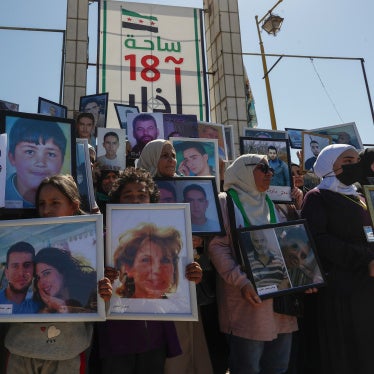Human Rights Watch called on the Lebanese government to commit adequate time and resources to effectively investigate the cases of an estimated 17,000 Lebanese civilians who were kidnapped or "disappeared" during the civil war of 1975-90.
Lebanese authorities should also investigate the cases of Lebanese citizens and stateless Palestinians who "disappeared" in Lebanon after 1990, and are known or believed to be imprisoned in Syria, Human Rights Watch said.
"The families of the ‘disappeared' are still waiting for answers," said Hanny Megally, executive director of the Middle East and North Africa division of Human Rights Watch. "The Lebanese and Syrian governments should use this anniversary to commit themselves to serious investigations."
In response to a vocal grass-roots movement in Lebanon that has been pressing for official investigations of the cases of those who went missing during the civil war, the government in January 2000 established an official commission of inquiry composed of five military and intelligence officers. The commission was charged with reporting its findings to Prime Minister Selim al-Hoss within three months. Human Rights Watch urged the commission to commit adequate time and resources to the enormous task of investigation.
"The commission cannot conceivably determine the fate or whereabouts of 17,000 people in such a short time," Megally said. "Eyewitness testimony and other evidence must be carefully collected on a case by case basis in order to account for each missing person. Those assigned this important work must have complete independence, and be provided with the staff and other resources required to carry out thorough, effective, and transparent investigations in which the public will have confidence."
Human Rights Watch also called on the Syrian government to account fully for all "disappeared" individuals who are in its custody, to make public the names of individuals held in Syria, and to release immediately and unconditionally those who are unlawfully detained. Megally urged the Lebanese government to open the files on these victims and pursue their cases vigorously with the Syrian authorities.
Human Rights Watch has written repeatedly to Syrian officials on behalf of some of the families of the "disappeared," but has received no replies.
"Disappearances" are among gravest crimes in international law and may constitute crimes against humanity, whether committed in times of war or times of peace. The Declaration on the Protection of All Persons from Enforced Disappearances, which was adopted by the United Nations General Assembly on 18 December 1992, states that investigation of a case of "disappearance" should be able to be conducted for as long as the fate of the victim of enforced disappearance remains unclarified (article 13.6). The declaration also states that persons who have or are alleged to have committed these offenses "shall not benefit from any special amnesty law or similar measures that might have the effect of exempting them from any criminal proceedings or sanction








